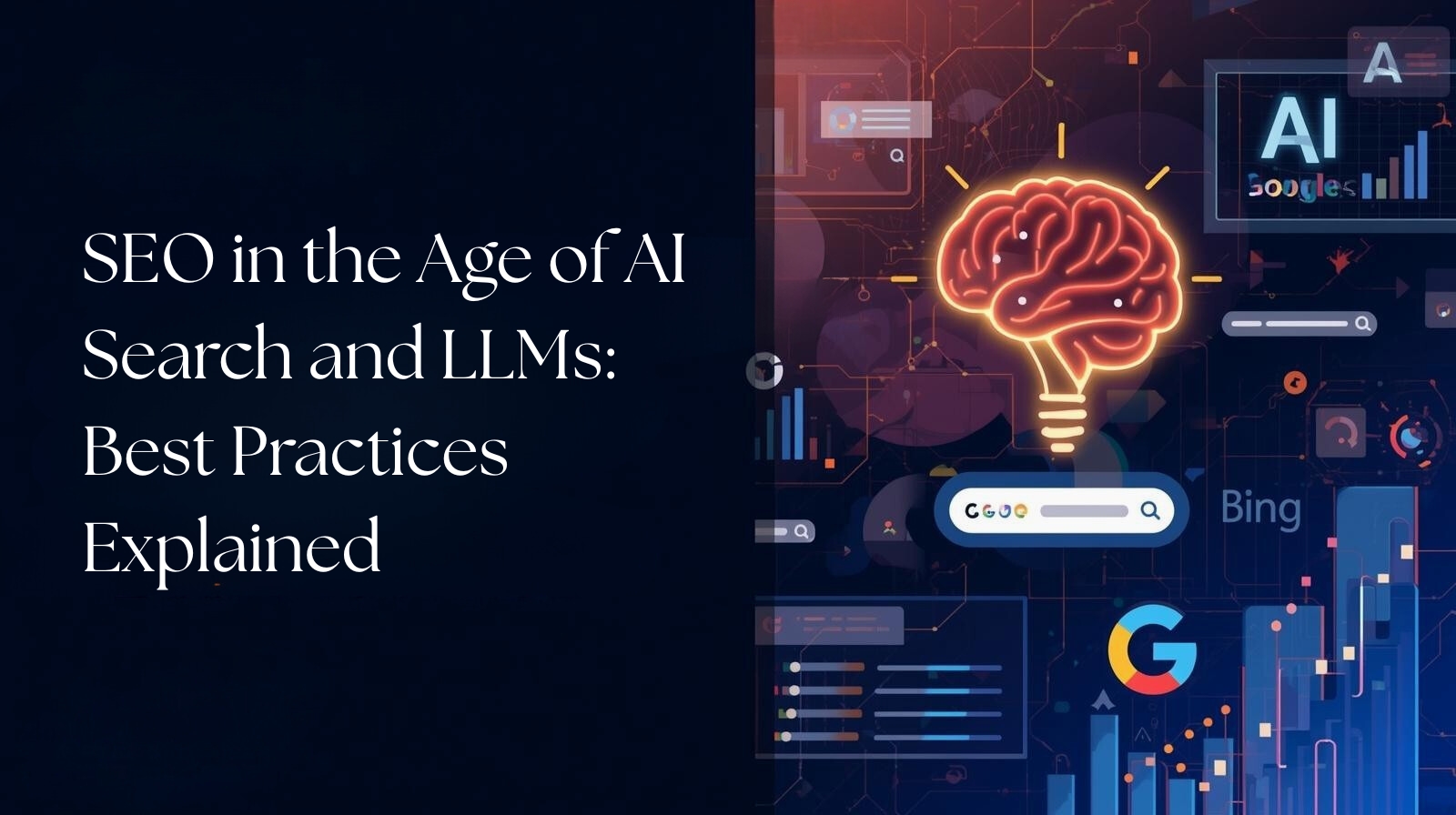Search Engine Optimization (SEO) has always been about one principle: ensuring that your business or brand is visible when people are looking for what you offer. For two decades, SEO professionals, businesses, and digital marketers have adapted to changes in search engine algorithms, user behaviors, and content technologies. But in 2025, a new challenge—and opportunity—has redefined the landscape: the rise of AI-powered search and Large Language Models (LLMs).
From Google’s Search Generative Experience (SGE) to AI-driven platforms like ChatGPT, Gemini, and Perplexity AI, search no longer works the way it once did. Instead of simply displaying a list of web pages ranked by algorithmic rules, modern search engines generate direct, conversational answers based on a deep understanding of language, context, and user intent. This is where SEO for AI Search becomes critical.
This article explores in depth what SEO means in the age of AI, how businesses and professionals can adapt, and the best practices required to thrive in this new era. Whether you are a business leader, a web developer, or a digital strategist, this guide will equip you with the knowledge and strategies to stay ahead of the curve.
The Shift from Search Engines to Answer Engines
To understand the importance of SEO for AI Search, it is essential to recognize the fundamental shift occurring in how information is retrieved.
Traditional Search vs. AI Search
In the traditional model, a user enters a query, the search engine scans its index of web pages, and then delivers ranked links that (hopefully) contain the answer. This ranking was influenced by keywords, backlinks, site authority, and technical optimization.
AI search, however, works differently:
-
It interprets context and intent rather than relying only on keywords.
-
It generates summarized answers, often without requiring users to click through.
-
It considers entities, semantic relationships, and trust signals.
-
It pulls from multiple sources and integrates them into a single, coherent response.
This means businesses are no longer competing only for “page one rankings.” Instead, they are competing for inclusion and citation in AI-generated answers.
Why SEO for AI Search Matters

The rise of LLMs has not made SEO obsolete—it has made it more important than ever. Here’s why:
-
Visibility in AI-generated answers
If your content is not optimized for AI search, it risks being excluded from the summaries and direct responses that now dominate the search experience. -
Trust and authority as ranking factors
AI models prioritize content that demonstrates expertise, accuracy, and authority. Businesses without these qualities will fall behind. -
Changing user behaviors
Users no longer want to sift through multiple links. They expect AI-driven engines to provide direct, trustworthy answers. -
Evolving SEO Services
Professional SEO Services are now focusing not only on rankings but also on Generative Engine Optimization (GEO)—ensuring content is prepared for AI-powered discovery.
Core Principles of SEO in the Age of AI
The following principles define the future of optimization for businesses:
1. Intent Over Keywords
AI interprets meaning, not just words. This requires businesses to focus on semantic SEO—structuring content around concepts, topics, and questions rather than keyword repetition.
2. Experience, Expertise, Authoritativeness, Trustworthiness (E-E-A-T)
Credibility is the new currency. AI rewards content that comes from real experts, is backed by evidence, and demonstrates practical experience.
3. Structure and Accessibility
Well-structured content—using headings, bullet points, tables, and schema markup—is easier for AI to interpret and summarize.
4. GEO (Generative Engine Optimization)
This emerging discipline focuses on making your content “answer-ready” for AI systems. GEO involves writing in a conversational yet authoritative style, creating FAQs, and offering clear, quotable insights.
Best Practices for SEO for AI Search

Below are the comprehensive strategies businesses must implement to stay competitive in AI-driven search environments.
Optimize for Semantic SEO and NLP
AI models understand entities and context better than any algorithm before them. That means content should focus on related concepts and not just primary keywords.
For example, alongside “SEO for AI Search,” include terms like:
-
Generative Engine Optimization (GEO)
-
Conversational queries
-
AI-powered content strategy
-
Entity-based SEO
-
NLP-driven search optimization
This creates a semantic web of information that AI can use to evaluate relevance.
Focus on User Intent and Context
AI-powered search tools thrive on delivering intent-driven answers. This requires anticipating what users really want, not just what they type.
Example:
-
Old SEO: Optimize for “best CRM software.”
-
AI SEO: Optimize for “Which CRM software is best for a small design agency with under 50 employees?”
By addressing specific scenarios and contexts, businesses ensure their content aligns with how AI generates responses.
Reinforce E-E-A-T in Content
Trust signals are non-negotiable in the AI era. Businesses must demonstrate:
-
Experience: Showcase firsthand knowledge and practical insights.
-
Expertise: Ensure content is authored or reviewed by qualified professionals.
-
Authoritativeness: Gain mentions and links from industry leaders.
-
Trustworthiness: Maintain accuracy, cite sources, and update regularly.
A blog without visible author expertise may rank less favorably compared to one authored by a subject-matter expert.
Create AI-Friendly Content Structures
AI thrives on clarity and organization. Content should be designed for quick parsing and easy extraction.
-
Use clear headings (H2, H3).
-
Include lists and step-by-step guides.
-
Add comparison tables to simplify evaluation.
-
Implement FAQ schema to match conversational queries.
Example table:
| Traditional SEO | SEO for AI Search |
|---|---|
| Focused on keyword density | Focused on semantic meaning |
| Optimized for rankings | Optimized for answers |
| Volume-driven content | Authority-driven content |
| Links build authority | Trust and expertise build authority |
Embrace GEO (Generative Engine Optimization)
Generative Engine Optimization is the new SEO frontier. It ensures your content is optimized for AI models.
Best practices for GEO include:
-
Writing in a conversational, human-like style.
-
Creating direct, quotable insights.
-
Using structured data to feed AI systems.
-
Offering unique expert commentary beyond surface-level information.
Maintain Technical SEO Excellence
AI search still depends on strong technical SEO foundations. Businesses should prioritize:
-
Fast loading speeds to ensure seamless user experiences.
-
Mobile-first design, since most searches are mobile-driven.
-
HTTPS security for trust.
-
Crawlable architecture for AI indexing.
-
XML sitemaps and schema markup for better interpretation.
Without technical strength, even the best content risks invisibility.
Develop Comprehensive, Long-Form Content
AI search engines favor detailed, context-rich content that provides depth. Long-form content (1,500–3,000 words) increases the chances of being included in AI-generated answers.
-
Provide in-depth explanations.
-
Include data, statistics, and references.
-
Offer expert perspectives and real-world examples.
Use FAQs to Align with Conversational Search
Since AI-powered tools process natural language queries, FAQs are invaluable.
Examples of effective FAQs:
-
What is SEO for AI Search?
-
How does Generative Engine Optimization (GEO) work?
-
Will AI replace traditional SEO?
-
What role do SEO Services play in the AI era?
This aligns your content with the way users and AI interact.
Practical Example: How AI Search Changes SEO Strategy
Imagine two businesses competing in the same industry.
-
Business A writes a 1,000-word blog with keywords but limited structure.
-
Business B writes a 2,500-word in-depth article with expert commentary, clear formatting, FAQs, and structured data.
In traditional search, both might rank based on backlinks and authority. But in AI-powered search, Business B has a much higher chance of being cited because its content is structured, trustworthy, and comprehensive.
Future Predictions: Where SEO Is Headed
-
Integration of GEO into mainstream SEO Services
Agencies will include Generative Engine Optimization in every strategy. -
Entity-first indexing
Search will rely less on websites and more on entities (brands, authors, products). -
Voice search dominance
AI-driven, conversational voice queries will further increase demand for natural, answer-ready content. -
AI citation transparency
Users will want to know which sources AI engines pull from, making credibility even more important. -
Human + AI synergy
Businesses will need to balance AI optimization with human storytelling to remain authentic.
Conclusion
SEO is not dying—it is evolving. The rise of AI search and LLMs has transformed traditional search engines into answer engines, where visibility depends on trust, authority, and context, not just keywords.
To stay competitive, businesses must adopt SEO for AI Search by:
-
Optimizing for semantics and intent.
-
Reinforcing E-E-A-T signals.
-
Creating structured, answer-ready content.
-
Embracing Generative Engine Optimization.
-
Maintaining strong technical SEO foundations.
In this environment, professional SEO Services are critical to navigating the shift. Businesses that adapt early will not just survive but thrive, becoming the trusted voices AI cites in its answers.
The future of SEO belongs to those who can blend human expertise with AI alignment. The opportunity is clear: if AI is the new gatekeeper of knowledge, your goal is to ensure it speaks in your voice.
FAQs on SEO in the Age of AI Search and LLMs
Q1. What is SEO for AI Search?
SEO for AI Search refers to optimizing websites and content for AI-driven search engines and large language models (LLMs). Unlike traditional search engines that rely heavily on keywords and backlinks, AI search focuses on semantic understanding, user intent, and contextual answers.
Q2. How are LLMs like ChatGPT or Google’s SGE changing SEO?
LLMs process queries conversationally and generate summarized responses. This shifts SEO strategies toward creating authoritative, structured, and intent-driven content that AI can easily interpret and recommend.
Q3. Why is Generative Engine Optimization (GEO) important?
GEO ensures your content is optimized for AI-powered engines that provide direct answers. By structuring content with FAQs, schema markup, and semantic SEO, businesses can increase visibility in AI-generated summaries.
Q4. Do traditional SEO strategies still matter in the AI era?
Yes. Core practices like technical SEO, mobile optimization, site speed, and backlinks remain crucial. However, they must be combined with AI-specific strategies such as structured data, topic clustering, and expertise-driven content.
Q5. How can businesses use SEO Services effectively for AI search?
By partnering with professional SEO services, businesses can implement advanced strategies like entity optimization, content structuring, and schema integration. These services help align websites with how AI interprets and delivers content.
Q6. What type of content performs best in AI search?
Content that is:
-
Comprehensive but concise
-
Structured with clear headings, lists, and FAQs
-
Authoritative, accurate, and backed by expertise
-
Contextual and aligned with user intent
Q7. Is keyword optimization still relevant in the age of AI search?
Yes, but in a more natural way. Instead of keyword stuffing, focus on semantic keywords, entities, and topic relevance. AI prefers content that reads naturally while answering complex queries.
Q8. What role does E-E-A-T play in AI SEO?
Experience, Expertise, Authoritativeness, and Trustworthiness (E-E-A-T) are essential. AI-driven search engines prioritize reliable, expert content that builds user trust and reduces misinformation.
Q9. How can I future-proof my SEO strategy for AI search?
-
Embrace GEO (Generative Engine Optimization)
-
Optimize for voice and conversational search
-
Implement schema markup and structured data
-
Create user-first, high-value content
-
Regularly update and refine content for accuracy
Q10. Will AI replace SEO professionals?
No. AI will transform SEO, but professionals remain vital for strategy, creativity, and interpreting complex data. AI tools assist, but human expertise ensures sustainable growth.

